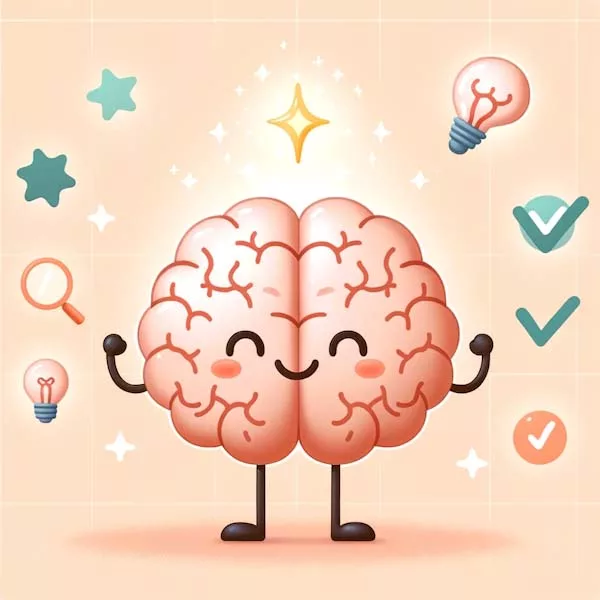Dopamine, which many call the brain’s ‘feel-good’ chemical, is really so much more than just a quick boost of happiness. It plays a pivotal role in our brain’s reward system, influencing our actions, motivations, and the pleasures we derive from them. This detailed look at dopamine and motivation will shed light on its role in reward-seeking behaviors and goal achievement, and how effectively harnessing its power can lead to a healthier and more satisfying life.
A brief Intro to Dopamine
Dopamine is a key chemical in your brain that acts like a spark for seeking rewards. It’s released when we’re about to experience something rewarding, encouraging us to chase after what we need or desire. This chemical isn’t just about making us feel good; it’s essential for pushing us to meet important needs, even when it requires effort.

More than just a source of pleasure, dopamine has a powerful influence. It can be quite addictive because of the satisfaction it brings. The reason we enjoy the release of dopamine so much is because it propels us to take action towards crucial survival needs like food, safety, and social interactions. Essentially, dopamine is a built-in motivator in our brains, ensuring we pursue and fulfill our basic life necessities.
The Dopamine Reward System
The dopamine reward system is an intriguing aspect of how our brains work. It’s centered around the idea that when we complete tasks or achieve our goals, our brain releases dopamine. This release isn’t just random; it’s a well-timed reward that brings a sense of pleasure and satisfaction. It’s like the brain’s way of giving us a ‘high-five’ for accomplishing something.
Understanding this system can be a real game-changer in how we approach our personal goals. When we recognize that our brain rewards us with good feelings for completing tasks, we can use this knowledge to our advantage. By setting small, achievable goals, we ensure a steady release of dopamine, keeping us motivated and on track. This isn’t just about big achievements; even small daily tasks, when completed, can give us this boost.

Knowing about the dopamine reward system helps us create a cycle of positive reinforcement. Each time we reach a milestone, no matter how small, our brain rewards us, making us more eager to tackle the next task. This understanding can transform the way we set and pursue our goals, turning what might seem like mundane tasks into steps towards a greater sense of achievement and fulfillment
Understanding Quick Rewards and the Role of Dopamine
Instant gratification is our natural inclination to seek immediate pleasure or satisfaction. In today’s world, this often manifests in activities such as indulging in junk food, scrolling through social media, immersing in video games, or going on shopping sprees. These actions offer quick, yet fleeting, moments of joy. Engaging in these activities, or even just anticipating them, triggers rapid surges of dopamine in our brains. This process reinforces the behavior, making us more likely to repeat it because the instant reward feels more compelling than waiting for a bigger, but delayed, payoff.

Consider the common scenario of reaching for your phone. It’s not just about staying connected; it’s about chasing that dopamine boost. Each new message, like, or piece of intriguing information delivers a hit of this feel-good chemical. In that moment, you’re seeking more than just distraction, connection, or validation – you’re after a neurological reward. However, this satisfaction is short-lived, as dopamine is quickly metabolized, and soon enough, you find yourself scrolling endlessly in the hopes of sustaining that pleasant sensation, but it’s always fleeting.
Relying on such methods for dopamine release can be unproductive and oftentimes unhealthy. Over time, th brain becomes overstimulated and desensitized to dopamine. There are far more beneficial ways to stimulate this essential neurotransmitter, ways that not only align with your productivity goals but also support your overall well-being. Embracing healthier practices can lead to sustained happiness and fulfillment, nourishing your body, mind, and spirit in the process.
Harnessing Dopamine for Daily Success
Practical strategies and daily habits can tap into the natural power of dopamine to enhance motivation and goal achievement. Setting small, achievable goals, engaging in positive routines like mindfulness, and avoiding overstimulation are key steps to maintaining a healthy balance. The methods outline below are simple yet effective in keeping dopamine levels optimal, ensuring a steady journey toward personal success.
Set Small Goals
The key to maintaining regular dopamine release is setting small, achievable goals. By breaking down your larger objectives into manageable chunks, you create opportunities for frequent dopamine ‘hits’. Each time you near the completion of these mini-goals, your brain rewards you with a burst of dopamine, recognizing your progress towards a larger aim. Even for tasks you’re not keen on, try committing just 10 minutes a day. These brief, consistent efforts accumulate over time, steadily moving you towards your ultimate goal.
Suggested Technique – The Pomodoro Method
This popular time management method involves working in focused intervals (typically 25 minutes), followed by short breaks. It’s an excellent way to create a rhythm of work and rest, triggering regular dopamine releases as you complete each interval.

Celebrate Your Small Wins
Every step forward deserves recognition. Allow yourself to savor the sense of achievement, no matter how small. This act of celebration isn’t just about feeling good; it’s a strategic move. Recognizing and relishing in these small victories keeps the momentum going, making it easier to continue pushing towards larger goals. Remember, many small steps lead to significant milestones, and acknowledging each one reinforces your path to success.
Take, for instance, my personal experience with doing the dishes. I’ve always found this chore to be particularly challenging and it requires a good deal of mental effort for me to get started. So, every night after I clear the sink and leave my kitchen spotless, I take a moment to appreciate what I just did. I look around and savour the cleanliness. It may seem trivial, but this nightly triumph over a task that I don’t enjoy doing leaves me going to bed with a sense of accomplishment and a positive mindset.
Build Positive Habits
Aligning your daily habits with dopamine release can lead to dual benefits. For example, engaging in mindfulness or meditation practices not only enhances mental clarity and emotional balance but also contributes to consistent dopamine release. This practice, often overlooked, can be a powerful tool for boosting both your mental and physical well-being.
Avoid Overstimulation
It’s crucial to be mindful of activities that trigger excessive dopamine release, like spending too much time on social media or playing video games. These can lead to a decrease in dopamine sensitivity over time, making it harder to find pleasure in everyday activities. Balance is key.
Other Ways to Boost Dopamine
Exercise
Engaging in physical activity is a fantastic way to naturally increase your dopamine levels. Regular exercise not only boosts your mood but also enhances your energy levels. Activities like jogging, cycling, or even a brisk walk can trigger the release of this feel-good neurotransmitter.

Healthy Eating
What you eat has a significant impact on your dopamine levels. Foods rich in tyrosine, the building block of dopamine, are particularly beneficial. Include items like bananas, nuts, and lean proteins such as chicken, fish, and beans in your diet to naturally boost dopamine production.
Sleep
Never underestimate the power of good sleep when it comes to regulating your dopamine levels. Quality sleep helps balance your neurotransmitters, including dopamine. Ensuring that you get enough restful sleep can help maintain optimal dopamine levels, affecting your mood and alertness.
Sunlight and Nature
Spending time in the sunlight and surrounding yourself with nature can have a surprisingly positive effect on your dopamine levels. Sunlight exposure, especially in the morning, can boost your mood and increase dopamine. Similarly, being in nature, such as parks or forests, has a calming effect and can enhance dopamine production, contributing to a sense of well-being and relaxation.
Conclusion
Understanding the nuances of dopamine can be key in leading a life of fulfillment and achievement. By setting small, manageable goals, adopting positive dopamine habits, and acknowledging every small success, we can maintain balanced dopamine levels and sustained motivation. Dopamine offers quick bursts of pleasure, but its long-term benefits are best realized through sustainable stimulation from healthy activities and habits. Embracing practices such as regular exercise, nutritious eating, adequate sleep, and time spent in nature is essential. These activities not only boost dopamine in a balanced way but also contribute to our overall well-being and long-term happiness.
